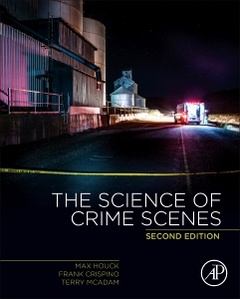Description
The Science of Crime Scenes (2nd Ed.)
Language: English
Subject for The Science of Crime Scenes:
Support: Print on demand
Description
/li>Contents
/li>Readership
/li>Biography
/li>Comment
/li>
The Science of Crime Scenes, Second Edition offers a science-based approach to crime scenes, emphasizing that understanding is more important than simply knowing. Without sacrificing technical details, the book adds significantly to the philosophy and theory of crime scene science. This new edition addresses the science behind the scenes and demonstrates the latest methods and technologies with updated figures and images. It covers the philosophy of the crime scene, the personnel involved at a scene (including the media), the detection of criminal traces and their reconstruction, and special crime scenes, such as mass disasters and terroristic events.
Written by an international trio of authors with decades of crime scene experience, this book is the next generation of crime scene textbooks. This volume will serve both as a textbook for forensic programs, and as an excellent reference for forensic practitioners and crime scene technicians with science backgrounds.
SECTION 1: THE SCIENCE OF CRIME SCENE INVESTIGATION1. The “Forensic Mindset2. What Is a Crime Scene?
SECTION 2: PERSONNEL AND PROCEDURES3. Personnel4. General Crime Scene Procedure
SECTION 3: DETECTION AND RECONSTRUCTION5. Searching for Evidence: Recovery6. Evidence Types and Enhancement7. Crime Scene Reconstruction
SECTION 4: SPECIAL CRIME SCENES8. Special Crime Scenes
Forensic program students, forensic practitioners and crime scene technicians with science backgrounds, and those interested in the science of crime scenes (sibling forensic science programs, such as anthropology and digital evidence).
Widely published, Houck has dozens of peer-reviewed journal articles and is the author and editor of numerous books. He is co-author of the best-selling Fundamentals of Forensic Science, Science of Crime Scenes, and Success with Expert Testimony, among others. He is the editor of the Advanced Forensic Science series of books. Houck is also founding co-editor of Forensic Science Policy and Management (the official journal of ASCLD), the only journal that addresses the management, policy, and administration of forensic science.
Houck has served on numerous committees, including for the National Academies of Science, NIST, Interpol, The Royal Society, the Director of the FBI, and the White House. He is a popular public speaker and has given presentations at NASA, the Max Planck Institute, an Oxford Roundtable, as well as keynote talks at numerous international conferences. Houck has taught at several universities, including West Virginia University and University of Tampa. His research topics include management, leadership, and policy implications for forensic organizations.
Houck has a Bachelors and Masters degree in anthropology from Michigan State University. He received his Ph.D. in Applie
- Includes in-depth coverage of disasters and mass murder, terror crime scenes and CBRN (Chemical, biological, radioactive and nuclear) – topics not covered in any other text
- Includes an instructor site with lecture slides, images and links to resources for teaching and training




